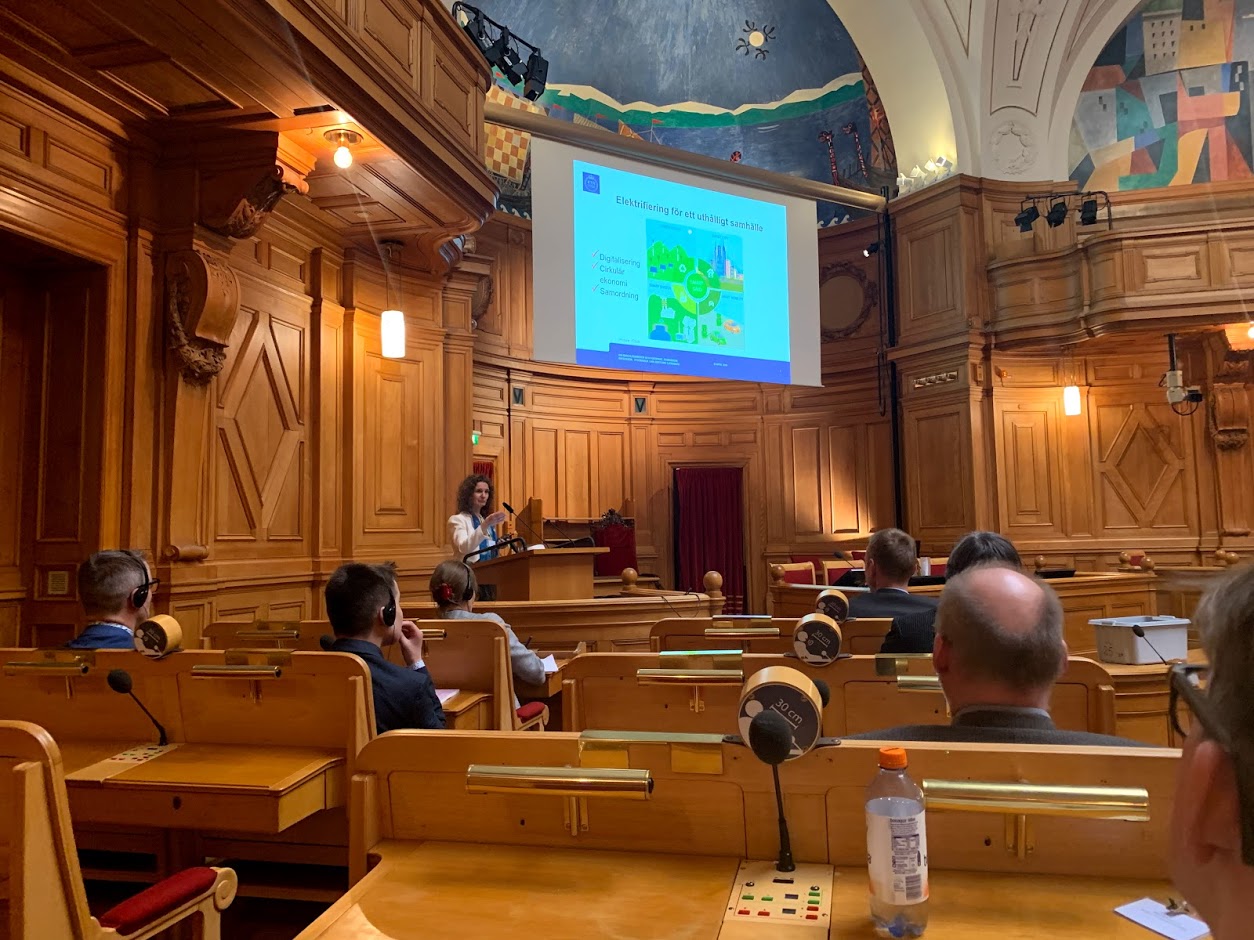Politicians gain knowledge from energy researchers and energy sector
“Electrification: threats and opportunities”

The energy and transport sector are on the threshold of a far-reaching transformation. Key driving factors include climate change initiatives that are paving the way for greater numbers of electric vehicles and more renewable energy sources such as solar and wind. The challenge is to develop today’s electrical grid and infrastructure into sustainable systems of the future.
“Electrification is happening right now – even in heavy transport. Something that requires robust co-operation between industry, academia, and politicians,” said Bertling Tjernberg, professor in electrical grids and director of KTH’s Energy Platform.
When the Swedish Society of Parliamentarians & Scientists, Rifo, hosted the “Electrification: threats and opportunities” seminar, the main chamber of the Swedish parliament was packed with curious participants. The seminar attracted unusually high numbers of attendees including some 80 researchers, politicians, members of the public, and industry representatives.
“This event gives us the opportunity to make our knowledge directly available to the political system, which is pretty fantastic,” said Bertling Tjernberg, who is also deputy chairman of RIFO.
The evening opened with a panel that included Yvonne Ruwaida, business strategist at Vattenfall Eldistribution; Magnus Höglund, senior advisor at Scania; Björn Hasselgren, researcher on secondment to the Swedish Transport Administration and Uppsala University; Anders Nordelöf, researcher in lifecycle analysis at Chalmers; and Maria Sunér Fleming, Confederation of Swedish Enterprise.
Major investment for the automotive industry
The transition to an electrified transport fleet places major demands on the automotive industry, Höglund believes.
“Extraordinarily large amounts of investment are needed, which need to be managed alongside existing activities. In terms of expanding infrastructure, we need to collaborate with others. And even if the pace of change is rapid, we must be bold and make decisions quickly. If we fail to do so, we’ll soon be left behind,” he said.
The energy sector has long lead times with up to 10 years from decisions to project completions, the panel said.
“The political establishment has a responsibility to consider how existing processes can be accelerated without abandoning the democratic process. And how we can improve collaboration to enable private investment in infrastructure,” said Hasselgren, researcher on secondment to the Swedish Transport Administration and Uppsala University.
Wanted: more knowledge
This will require improved collaboration and more knowledge, Vattenfall’s Yvonne Ruwaida stressed.
“Municipalities and the regions don’t know enough about the electrical grid today. They need more knowledge to be able to prioritise the right things and have closer dialogue with grid companies to be able to support the emergence of new electrical networks,” Ruwaida said.
Some of the knowledge for a more efficient and flexible energy system can originate from the EU’s CoordiNet project. Under the initiative, local marketplaces are being developed in four locations in Sweden as demonstration facilities for more efficient use of the electricity grid.
“Greater system understanding is needed to optimize the energy system. All too often, we focus on individual technical solutions, such as batteries, wind or nuclear power, and lose focus on overall system optimization. A better understanding of the system provides better economic models for society as a whole,” said Ruwaida.
Accurate facts for informed political decision making
Centre Party politician Rickard Nordin was one of those who attended the seminar, and he stressed that meeting researchers was among the most important things politicians can do.
“To listen, to gain knowledge and then weigh up alternatives. So having the correct facts to hand is vital. That’s why I meet a large number of researchers and people from academia regularly at seminars like this one and individual meetings and study visits,” said Nordin (Centre Party), MP.
Especially useful, according to Nordin, was knowledge of the various challenges that the transition of the energy and transport sector entails and which time aspects are relevant.
“For me, it confirmed much of the image I have, that this is not so much about technology but more about politics, economics, and business models. The nexus between politics, business and academia is absolutely vital for me to be able to make as informed decisions as possible in my role as a legislator and in negotiations with the government,” he said.
In terms of research, the regular seminars offer opportunities for strategic work to develop new research areas.
“This type of seminar is a great way to build on and stimulate new relationships and collaborations. In my role as Energy Platform director, it is my job to co-ordinate and support new collaborations between our own research groups and with other universities,” Bertling Tjernberg said.
Text: Magnus Trogen Pahlén
Translation: Nick Chipperfield